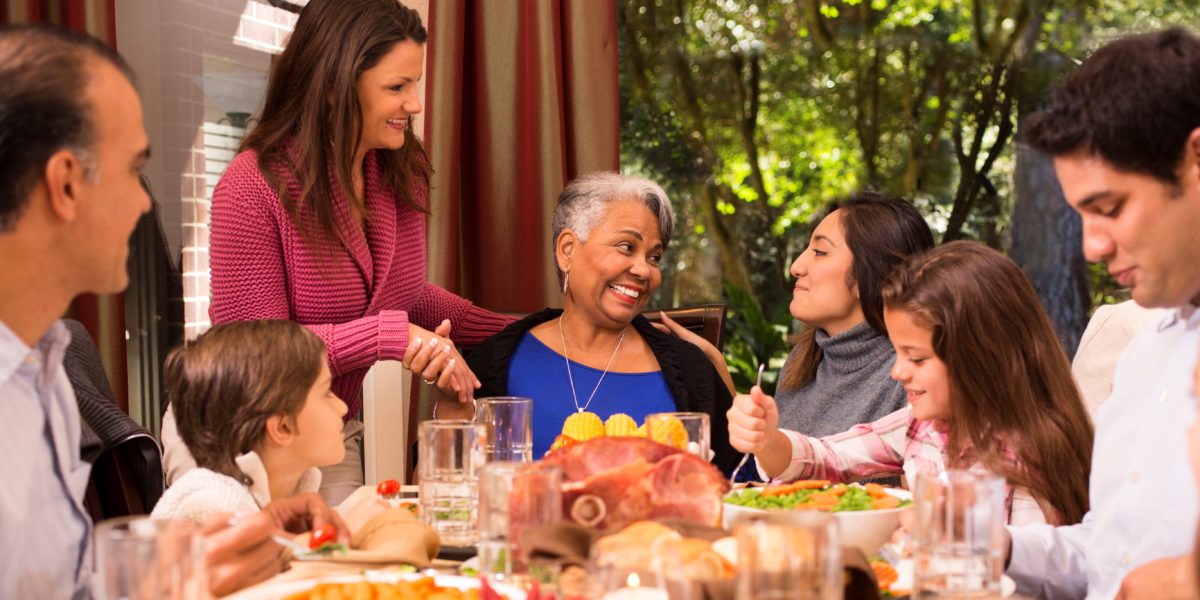At this year’s holiday dinner, encourage your relatives to pass more than just the pumpkin pie around the table. Family gatherings are a great time to update each other on significant life events from the past year — especially those involving health.
What you learn about your cousin Sally’s high blood pressure or Uncle Bob’s surgery could save your life.
Take time to learn more about your family’s medical history.
Soup to nuts and everything in between
Talking about health doesn’t have to be a holiday spoiler. In fact, it can bring families closer. Here are a few ways to get the conversation started:
- Start by offering an update on your own health and share steps you plan to take to embrace a healthier lifestyle. Ask your relatives to do the same. Even better, text them a few days before Thanksgiving to encourage them to come prepared to share what they know about your family’s health history.
- Make a list together of which family members had what disease or medical condition. At what age were they diagnosed? Did they die of it and if so how old were they? Pay attention to multiple relatives with the same diagnosis. Research shows a very clear link between certain genes and cancer risks, especially in families where:
- Cancer is diagnosed before age 50.
- Cancer shows up in more than one generation.
- Individual family members have bilateral cancer (cancer in both the left and right breasts).
- Cancer occurs in the less commonly affected gender (male breast cancer).
- Several rare cancers (ovarian, pancreatic, sarcoma) occur in a family.
The Centers for Disease Control and Prevention offers an online tool to help you organize your family medical history.
Bring history to the table
- Check the family Bible or other special keepsakes like a grandparent’s journal or letters for any notes about age and cause of death for past generations. Keep in mind that not so long ago, people were afraid to use the word “cancer.” Reference to something like “that woman’s disease” or “female troubles” may suggest a family risk for breast, ovarian or uterine cancer.
- Use your smartphone to record the older generation sharing what they remember about your family health history. Not only could the information be a lifesaver, future generations will appreciate those recordings.
- Make copies of the information for everyone in your family and encourage each person to share it with his or her health care provider.
- If your family is African American, conversations about family history are especially important. African Americans are at higher risk than any other racial or ethnic group for several types of cancer, and researchers lack sufficient critical information about African American families to help them understand why. The more families participate in genetic counseling and testing, the sooner scientists will have the information they need to find ways to prevent, diagnose and more effectively treat cancer and other diseases.
- A resolution worth keeping. Don’t let your family’s conversation about health end when the last Thanksgiving dish is dried and put away. In fact, make it a New Year’s resolution to keep the dialogue going. Any day of the year is a good day to learn more about what makes your family tree unique. Your relatives will be thankful that you started the conversation.
One final thought before the Black Friday shopping begins: home-based DNA tests may make a fun holiday gift for tracing ancestry, but they are not a substitute for genetic counseling and testing by a medical expert.
Call ChristianaCare at 302-623-4593, option 1, to schedule an appointment with a qualified genetic counselor about your family health history.



